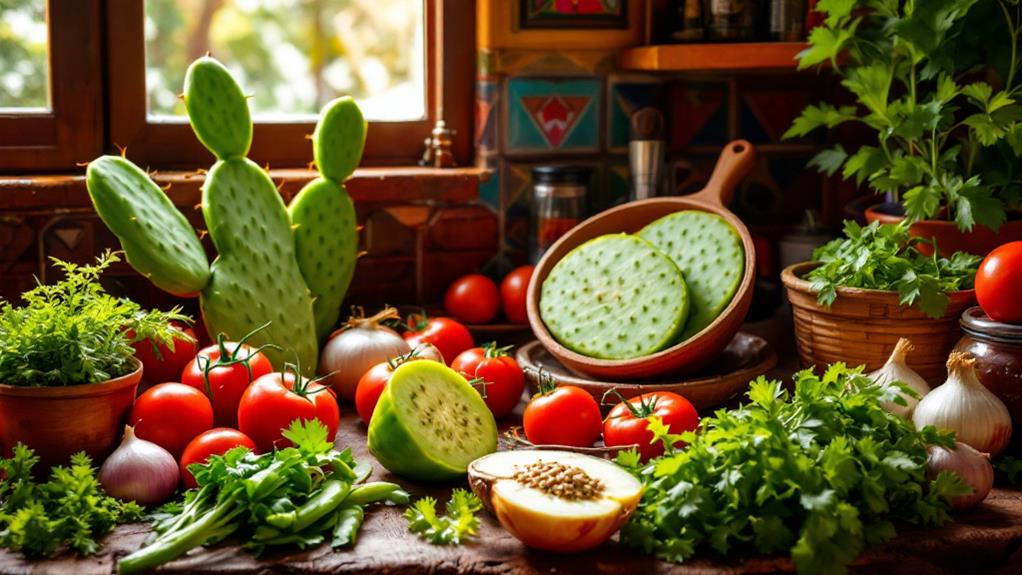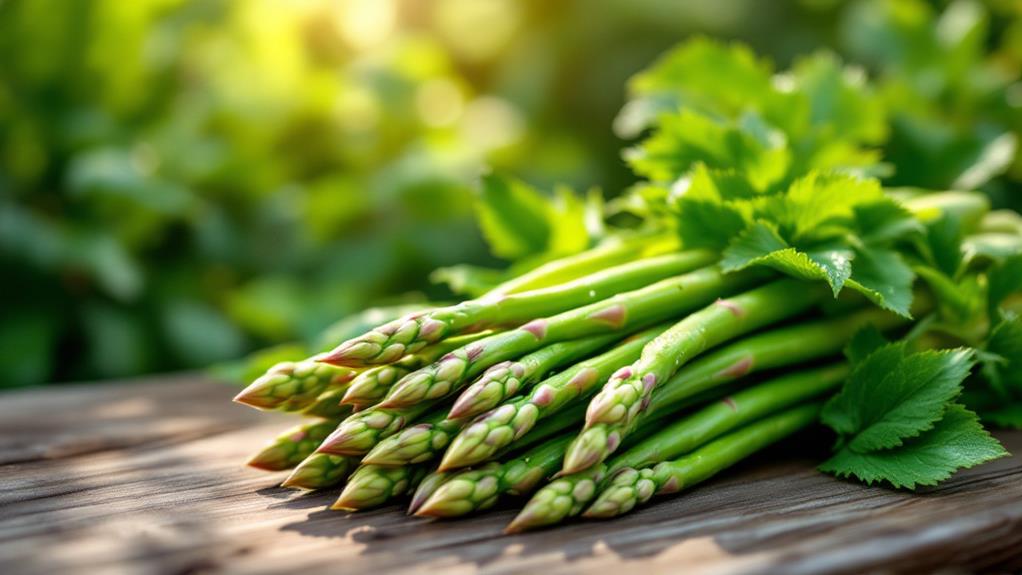A Complete Guide to the Types and Benefits of Watermelon
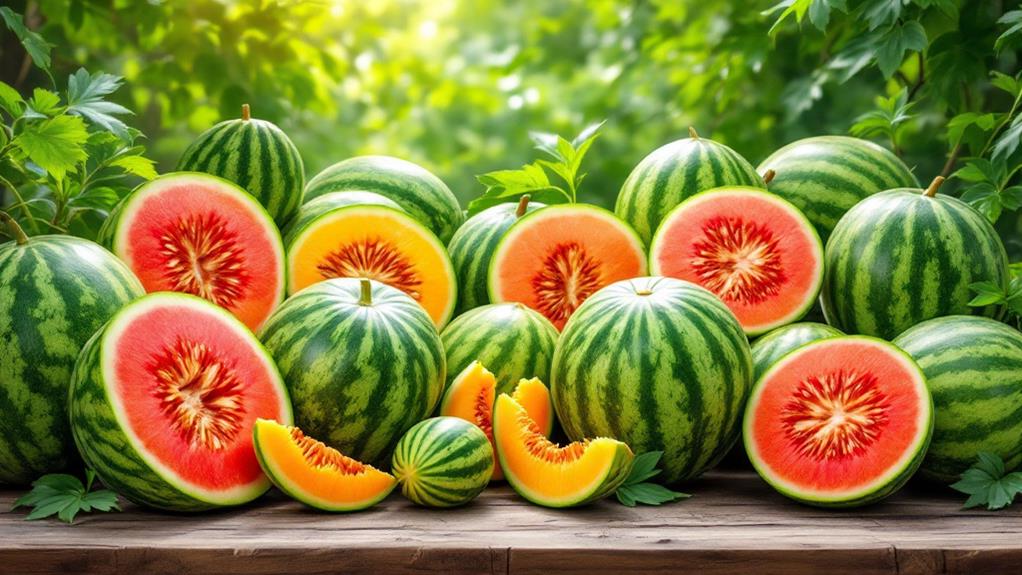
You'll find that watermelon is more than just a tasty fruit—it's a nutritional powerhouse. It's low in calories and packed with hydration benefits thanks to its high water content. Rich in antioxidants like lycopene, watermelon can help lower cancer risks and support heart health. Enjoy different types such as seedless, mini, and traditional seeded varieties, each offering unique flavors. Use it in salads, grilled dishes, or even roasted seeds for a protein enhancement. When selecting, choose firm watermelons with a ripe yellow spot. With proper storage tips, you'll increase its freshness and learn even more intriguing facts.
Nutritional Value of Watermelon
When you enjoy a rejuvenating slice of watermelon, you're not just indulging in a sweet treat; you're also benefiting from its impressive nutritional profile. Watermelon is a low-calorie option, with just 46 calories per cup, making it an ideal choice for those mindful of their caloric intake. Its high water content, approximately 90-92%, makes it excellent for hydration, essential for maintaining your body's fluid balance.
This juicy fruit is packed with important nutrients. With 12.3mg of vitamin C per cup, watermelon plays a significant role in immune support, helping you ward off illnesses. The 170mg of potassium in each serving aids in maintaining healthy blood pressure and general cardiovascular health. Furthermore, the 865 IU of vitamin A contributes to lively skin health.
Watermelon is rich in antioxidants, including lycopene, which is present at around 6,890 micrograms per cup. Lycopene is known for its potential in combating harmful free radicals, further supporting your general well-being. Although low in fiber, with just 0.6g per cup, watermelon's high water content improves digestive health by promoting regularity. Relish the invigorating taste while nourishing your body with these crucial nutrients.
Health Benefits and Research
Watermelon isn't just a rejuvenating summer snack; it's packed with health benefits backed by research. One of the key health benefits of watermelon is its high lycopene content, a powerful antioxidant. Consuming lycopene-rich watermelon has been linked to a reduced cancer risk, particularly for prostate and colorectal cancers. When you bite into a ripe, red-fleshed slice, you're getting a potent dose of this beneficial compound.
For your heart health, watermelon offers more than just a revitalizing taste. It contains L-citrulline, a compound that helps lower blood pressure and improve arterial function. This can lead to better cardiovascular health. Plus, with watermelon being 92% water, it supports hydration and muscle recovery, making it an excellent choice after exercise.
The antioxidants in watermelon also play a vital role in reducing inflammation and oxidative stress. By incorporating watermelon into your diet, you might lower your risk of chronic diseases and promote overall wellness. Additionally, watermelon aids digestive health. Its fiber content helps maintain bowel regularity and prevents constipation, ensuring your digestive system functions smoothly. Adopt these health benefits and let watermelon be a staple in your diet.
Types of Watermelon
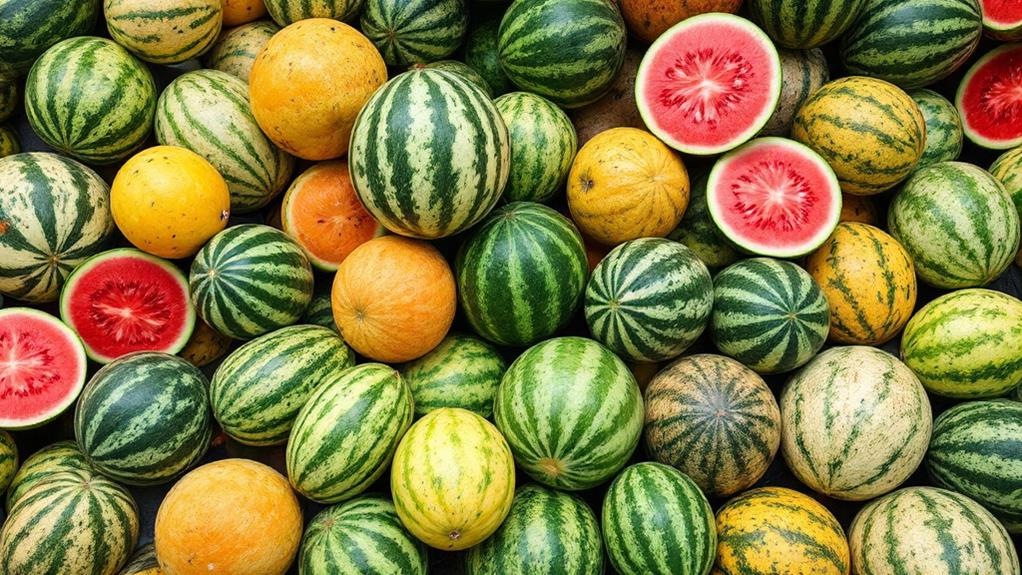
In conjunction with its impressive health benefits, watermelon comes in a variety of types that cater to different tastes and preferences. Among the most popular are seedless watermelons, which have taken over the market thanks to their convenience. These watermelons are developed through hybridization and have small, undeveloped seeds that you probably won't even notice when enjoying their sweet, juicy flesh.
For those who love a more classic experience, the traditional seeded watermelon is a must-try. This type boasts large, black seeds and is cherished for its authentic flavor and texture, reminiscent of summer days in many households. It offers a traditional experience that many consumers still seek out.
If you have a smaller household or want a quick snack, mini watermelons are perfect. Weighing between 5 to 7 pounds, they provide just the right amount without any waste. Their compact size makes them easy to handle and store.
Lastly, icebox watermelons are smaller with a thin rind, making them ideal for chilling. Their compact size is perfect for picnics and small gatherings, allowing for easy transport and serving. Each type offers unique characteristics and flavors, ensuring there's a watermelon for everyone.
Culinary Uses and Recipes
Ever wondered how versatile watermelon can be in the kitchen? Fresh watermelon is more than just a simple snack; it's a culinary powerhouse. You can enjoy it raw in wedges or cubes for a revitalizing and hydrating treat. Looking for something a bit more exciting? Toss it into salads with feta cheese, mint, and spinach to enhance both flavor and nutritional value.
For those who love a unique twist, try grilled watermelon. Just grill slices for about 2 minutes per side, and you'll get a delicious caramelized flavor that pairs wonderfully with savory dishes. But don't stop there! The watermelon rind shouldn't go to waste. You can pickle it for a crunchy snack or stir-fry it for extra fiber and nutrients.
And let's not forget the watermelon seeds. Roast them with a bit of olive oil and salt for a protein-rich snack, offering about 8 grams of protein per ounce. Finally, blend fresh watermelon into smoothies for an easy way to stay hydrated. With so many culinary uses, watermelon is a versatile and valuable enhancement to any kitchen.
Tips for Selection and Storage
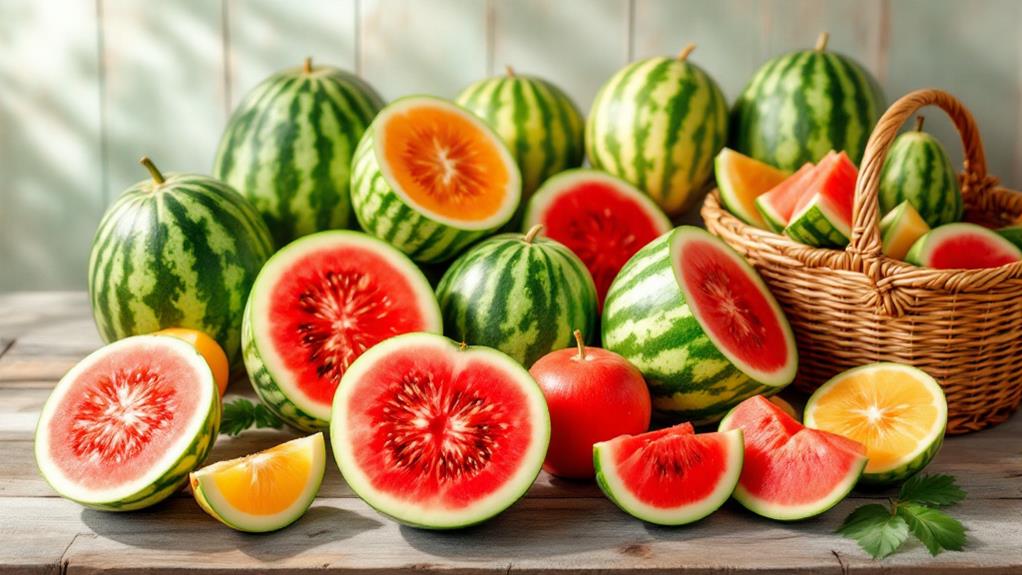
Although choosing the ideal watermelon might seem intimidating, a few simple tips can guarantee you pick the best one. Start by focusing on selection. Look for a watermelon that is firm, symmetrical, and heavy for its size, as this indicates ripeness and juiciness. Pay attention to the yellow spot on the underside; it shows the watermelon has ripened on the vine and will likely be sweeter. Steer clear of any with soft spots, bruises, or blemishes, which can suggest internal damage or spoilage.
For best storage, follow these guidelines:
- Cut watermelon: Store in an airtight container in the refrigerator to keep it fresh for up to five days.
- Whole watermelons: Keep them at room temperature until you're ready to cut them, but refrigerate after cutting.
- Freezing: If you want to store watermelon long-term, cut it into cubes and freeze. These frozen cubes work excellently in smoothies.

